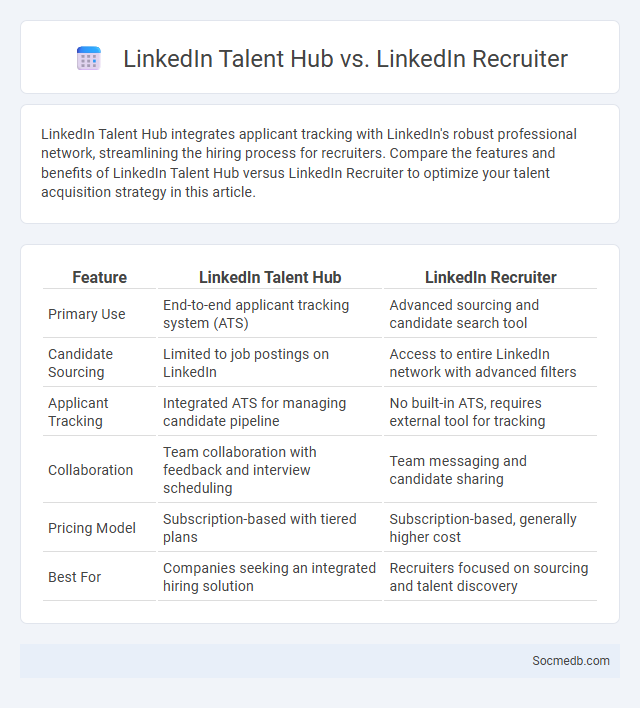
Photo illustration: LinkedIn Talent Hub vs LinkedIn Recruiter
LinkedIn Talent Hub integrates applicant tracking with LinkedIn's robust professional network, streamlining the hiring process for recruiters. Compare the features and benefits of LinkedIn Talent Hub versus LinkedIn Recruiter to optimize your talent acquisition strategy in this article.
Table of Comparison
| Feature | LinkedIn Talent Hub | LinkedIn Recruiter |
|---|---|---|
| Primary Use | End-to-end applicant tracking system (ATS) | Advanced sourcing and candidate search tool |
| Candidate Sourcing | Limited to job postings on LinkedIn | Access to entire LinkedIn network with advanced filters |
| Applicant Tracking | Integrated ATS for managing candidate pipeline | No built-in ATS, requires external tool for tracking |
| Collaboration | Team collaboration with feedback and interview scheduling | Team messaging and candidate sharing |
| Pricing Model | Subscription-based with tiered plans | Subscription-based, generally higher cost |
| Best For | Companies seeking an integrated hiring solution | Recruiters focused on sourcing and talent discovery |
Overview of LinkedIn Talent Hub, LinkedIn Recruiter, and Talent Acquisition
LinkedIn Talent Hub integrates applicant tracking with the LinkedIn network, streamlining recruitment workflows and enhancing candidate experience through a unified hiring platform. LinkedIn Recruiter offers advanced search filters, AI-driven recommendations, and real-time insights to help recruiters identify and engage top talent efficiently. Talent acquisition on LinkedIn leverages these tools alongside extensive professional data, enabling companies to attract, evaluate, and hire skilled candidates at scale.
Key Features of LinkedIn Talent Hub
LinkedIn Talent Hub integrates applicant tracking system (ATS) capabilities directly with LinkedIn's extensive professional network, enabling seamless candidate sourcing and management. It offers advanced candidate filtering, automated workflows, and collaborative tools for hiring teams to streamline recruitment processes. Real-time analytics and insights enhance decision-making by tracking key hiring metrics and candidate engagement.
Key Features of LinkedIn Recruiter
LinkedIn Recruiter offers advanced candidate search filters, including skills, location, industry, and experience level, enabling precise talent targeting. The platform supports seamless collaboration with hiring teams through project management tools and shared candidate pipelines. Automated outreach sequences and integrated InMail messaging enhance communication efficiency with potential candidates.
Defining Talent Acquisition in the Modern Workforce
Talent acquisition in the modern workforce involves leveraging social media platforms to identify, attract, and engage highly skilled candidates effectively. You can utilize targeted campaigns, employer branding, and data analytics on networks like LinkedIn, Instagram, and Twitter to enhance recruitment strategies and reach a diverse talent pool. This approach streamlines the hiring process by connecting employers with qualified professionals in real time.
Comparing Core Benefits: Talent Hub vs Recruiter
Talent Hub offers a streamlined platform for candidates and employers, centralizing profiles and job listings to enhance matching accuracy and reduce hiring time. Recruiter provides advanced search filters and networking tools, empowering recruiters to identify passive candidates and build talent pipelines effectively. Your choice depends on whether you prioritize direct talent access with Talent Hub or extensive search capabilities with Recruiter.
Integrations and Workflow Automation
Social media platforms increasingly support seamless integrations with tools like CRM systems, email marketing software, and analytics dashboards to streamline content management and audience engagement. Workflow automation enables scheduled posts, automated responses, and data syncing across multiple channels, enhancing efficiency and consistency in brand communication. Leveraging APIs and automation tools such as Zapier and Integromat optimizes social media strategies for real-time monitoring and performance tracking.
Pricing and Subscription Models
Social media platforms offer diverse pricing and subscription models tailored to various user needs, including free ad-supported access and premium ad-free subscriptions with exclusive features. Businesses can choose advanced plans with targeted advertising options, analytics, and increased visibility, often priced based on audience size or engagement metrics. Your selection depends on desired reach and budget, balancing cost against platform-specific benefits and ROI potential.
User Experience and Interface Differences
Social media platforms vary significantly in user experience and interface design, impacting user engagement and satisfaction. For example, Instagram prioritizes visual storytelling with a clean, image-focused interface, while Twitter emphasizes real-time text updates through a concise, timeline-based layout. Facebook combines multimedia posts with extensive navigation options, offering a complex but feature-rich interface tailored to diverse user interactions.
Suitability for Different Business Sizes
Social media platforms offer tailored advertising solutions suitable for businesses of all sizes, from small startups to large enterprises. Small businesses benefit from cost-effective, targeted campaigns on platforms like Facebook and Instagram that maximize local reach and engagement. Large corporations leverage advanced analytics and broad audience targeting on LinkedIn and Twitter to enhance brand visibility and customer insights.
Choosing the Right Solution for Your Talent Strategy
Selecting the ideal social media platform is crucial for an effective talent strategy, as each channel offers unique targeting capabilities and audience demographics. Leveraging LinkedIn allows precise engagement with professionals and passive candidates, while Instagram and TikTok excel in building employer brand awareness among younger talent pools. Integrating analytics from these platforms ensures data-driven decisions that refine recruitment campaigns and optimize talent acquisition outcomes.
 socmedb.com
socmedb.com